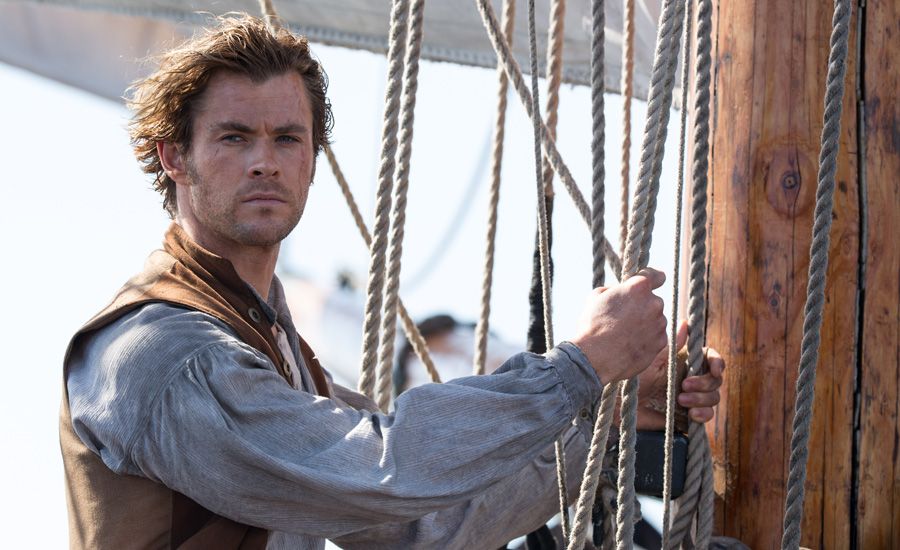Many know the plot of Herman Melville’s classic epic novel Moby Dick; the obsessive Captain Ahab hunts for the great white whale responsible for much of his seafaring misery. What you may not know is that Melville’s fictional yarn was based, at least partly, in truth. In his latest film, In the Heart of the Sea, director Ron Howard seeks to explore that truth.
In the winter of 1820, a New England whaling ship, the Essex, was attacked by a mammoth whale, its crew left stranded in the far reaches of the Pacific. While Moby Dick focuses on Ahab’s obessesion with defeating his sea-dwelling foe, Howard’s film (based off of the best-selling book of the same name by Nathaniel Philbrick) chronicles the true account of the Essex and its crew, after the whale destroys their ship and the hunters become the hunted.
Aussie actor Chris Hemsworth (Thor, The Avengers) plays swashbuckling first mate Owen Chase, a family man determined to earn his captain’s hat, despite the class limitations imposed by his father’s farming background. Chase is a leader amongst men with a knowing swagger and an uncanny ability to persuade others to follow him—that makes him a threat to the gifted but inexperienced Captain George Pollard (the brilliant Benjamin Walker), who struggles with his role on board the ship. Chase and Pollard are at odds for the better part of the first half of the film as Pollard aims to test his crew’s salt by sailing them directly into a coming squall, almost capsizing the ship before their journey has even begun.
But the man-vs.-man plot quickly expands thanks to a menacing leviathan – a large white whale bent on serving out his own special vengeance to the men hunting his species for whale oil. The whale wreaks havoc on the ship and the crew, eventually sending the Essex to the bottom of the ocean and stranding the men on the outer edge of the sea.
There is plenty of action and the cinematography, especially the sequences shot on board the ship, is breath-taking, but what’s most intriguing to Howard is the chance to demystify the mythology of the Essex and tell the true struggle of a group of ordinary men thrust into extraordinary circumstances.
“Though the film is set in the past, it touches on ideas about relationships, survival, humanity and nature that are relatable and thought provoking, and connect to our own sensibilities about who we are as people,” Howard says.
The director had his actors endure plenty of their own trails in order to bring authenticity to the film. Hemsworth describes the 500 calorie a day diet he eventually found himself on as a “pretty ugly” experience filled with mood swings and negative side effects.
Strong turns from Cillian Murphy and Tom Holland — the young man set to take on the role of Spiderman next year — round out the talented cast that thrives despite some regrettable script limitations. Bits of clunky dialogue and the intertwining story of Melville (played by Ben Whishaw in the film) interviewing an aged deckhand who survived the ordeal means the action is often interrupted.
While the movie’s draw rests on the clash between man and beast, it’s the fight for survival in the aftermath that is truly harrowing and worth the price of admission.
“There are three great trials encompassed in this story: man against man, man against nature, man against self,” Walker says. “How can you overcome those trials and survive? That’s the question of the movie. But there’s beauty in that; you see the endurance of the human spirit.”





